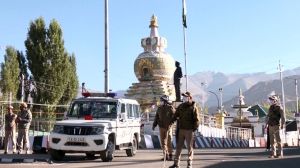Ministry, panel at war over control of population fund
NEW DELHI, AUG 31: The uncertainty over where the Rs 100 crore population stabilisation fund should be located has sown seeds of discord b...

NEW DELHI, AUG 31: The uncertainty over where the Rs 100 crore population stabilisation fund should be located has sown seeds of discord between the Population Commission and the Health Ministry. Oblivious to bickering, the Prime Minister’s Office and the Finance Ministry are taking their time deciding who gets to control the purse strings.
Prime Minister A.B. Vajpayee had announced the setting up of a corpus fund of Rs 100 crore to stabilise population at the first meeting of the much-hyped National Commission on Population on July 22, which he chairs. Since the Planning Commission has offered to contribute the initial corpus of Rs 100 crore, it feels it is the best equipped to manage the money, which will increase as donations and grants from non-governmental sectors — like corporations, institutions and NRIs — pour in.
The Ministry of Health and Family Welfare, meanwhile, is emphatic that the fund should be handled by them because it is the key ministry involved in the implementation of the national population policy. “The fund will naturally be managed by the health ministry,” says Union Health Minister Dr C.P. Thakur. “Not only have we begun implementation of the recommendations of the population commission, but are also coordinating with other departments such as education and water resources.”
The Empowered Action Group, setting up of which was announced by the Prime Minister on July 22, has already been set up within the Department of Family Welfare to focus attention on those states lagging behind in socio-demographic indices. A Health and Family Welfare Fair (Swastha and Parivar Kalyan Mela) is being organised in Mathura in Uttar Pradesh from September 17 to 19, and similar events will be held in other states, namely Bihar, Madhya Pradesh, Rajasthan, Orissa and the North-Eastern states of Assam, Manipur and Mizoram.
But what’s complicating matters is that the Population Commission is equally convinced that its their job to implement the population policy.“Since population stabilisation involves areas much beyond health — like education, women empowerment, child development, providing safe drinking water etc — the obvious choice it to locate the fund with us,” says Krishna Singh, Member Secretary, National Commission on Population. “We have a clear mandate to implement the national population policy,” she adds.
Singh explains that since many department have budgets for similar programmes — on nutrition, on education, women empowerment etc — the population commission would help facilitate a convergence of common goals. “We are here to facilitate, not usurp another department’s function,” says Singh. The ball is now in the Finance Ministry’s court.
The National Commission on Population was set up on World Population Day under the chairmanship of the prime minister to evolve strategies to effectively implement the population policy. Ministers from the concerned ministries and departments, chief ministers, NGOs and demographers are allmembers of this behemoth, which met for the first time on July 22.
Photos



- 01
- 02
- 03
- 04
- 05




























